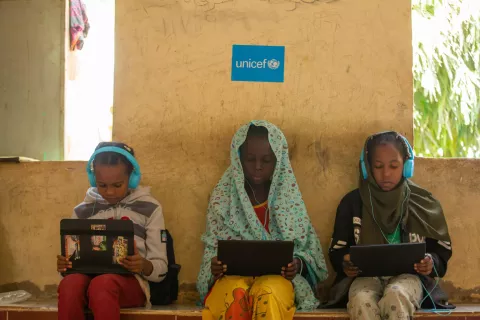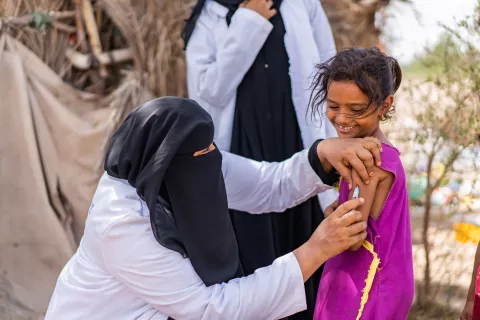A day in the life of a community midwife in Yemen
In a health system that is deteriorating because of the ongoing conflict, midwives like Ms. Abdu are a lifeline for Yemen’s mothers and children

- Available in:
- English
- Français
In the early morning hours of an otherwise ordinary day in Yemen’s Bani Hushaysh District, the sounds of bombs suddenly pierced the air. Residents of the community were frightened, and Ms. Kawkab Abdu Mohammed is the only community health worker who came to work that day. In a health system that is deteriorating because of the ongoing conflict, midwives like Ms. Abdu are a lifeline for Yemen’s mothers and children.
SANA’A, Yemen, 10 August 2016 – At 8:20 am, I arrived at the Bani Hushaysh District, due east of the Yemeni capital of Sana’a. The journey had started in the city at 7:00 am, and I was joined by UNICEF colleagues and staff from the Sana’a Governorate Health Office.
Our first stop was at the Bani Hushaysh District Health Centre, where we were met by Kawkab Abdu, a community midwife in the area. She told us that after a long, shaky period of ceasefire, they had heard sounds of bombs earlier that morning, which had frightened residents. “Don’t worry, we will protect you,” Ms. Abdu said as if to reassure me. I simply smiled and we moved into the health facility.
An integrated package
Ms. Abdu, 36, has been a community midwife in Bani Hushaysh since 2007, when she completed training on community-based maternal and newborn care. The training is given to community midwives to equip them with essential lifesaving skills.
Today she is the only health worker who has reported to work. The rest were scared by the sound of bombs and likely wanted to assess the situation before coming to work. Since the conflict in Yemen escalated, health centres have been severely affected. Some have been attacked, others have run out of medicines, fuel and electricity. In many cases, the health workers have fled.
>> Learn more about the humanitarian situation and needs in Yemen

In Bani Hushaysh, Ms. Abdu is a lifeline for the residents. She is described by the residents as an ‘integrated package’ – she administers vaccines, manages childhood diseases such as respiratory tract infections, diarrhoea and measles, and she also manages malnutrition by screening children, providing treatment and referring severe cases for further treatment.
A passionate midwife
Ms. Abdu is not only a committed professional but a passionate one. She says her dream was to be a doctor but she could not afford to go to medical school. She ended up enroling in a degree programme in education, but her dream of serving in the medical field kept haunting her.
One day when she heard that the District Health Office was looking for educated women to be trained as community midwifes, she quit the education course and instead registered for a midwifery degree. That was when her journey with the community started as she began providing midwifery support to women in the district. Since then she has assisted in the delivery of countless babies in the area, making her a household name in her community. As we walked through the village with her, we could see people’s respect and gratitude as they greeted and waved.
Every month, she says she helps about three to six women give birth. She then follows up to ensure the mother and baby are well nourished and healthy.
Today she took us along on a visit to Ali’s house where one month ago she helped his wife Om Mohammed deliver their eighth child, baby Mohammed. As soon as we arrived, with a smile on her face, she started doing physical checks on the baby for any signs of sickness or malnutrition. She did the same for the mother and then started giving lessons on the importance of exclusive breastfeeding.
She explained to the mother that exclusive and continuous breastfeeding for the first six months helps the rapid growth of the child physically and mentally. She also talked about the importance of maintaining good hygiene and sanitation. Soon, the other women in the house joined in and listened attentively, asking questions as Ms. Abdu responded in turn. Their conversation was punctuated with laughter – they were all enjoying the session.
We left Ali’s house after an hour and walked to Ms. Abdu’s house. She calls her home a ‘mini hospital’ because she has a room where she receives patients after working hours. She also keeps delivery records for mothers and other medical cases, helping her stay up to date on cases that require follow up.
“I am doing something for my people and I am happy about it,” she said as we ended our visit.


